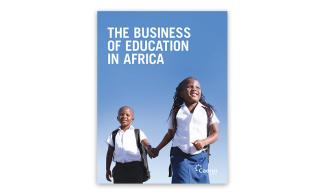Private education
Some people have no other choice

In 2017, the consultancy Caerus Capital published a report with the title “The business of education in Africa”. The authors estimated that 21 % of African children and young people were already being educated in the private sector at that point in time and reckoned the share would rise to 25 % by 2021. The report identified an investment need of up to $ 20 billion over five years.
While people with centre-left leanings in Europe tend to worry about private-sector education worsening inequality, many people in developing countries see it more favourably. The reason is that public-sector schools are normally quite trustworthy in advanced nations, but often perform dismally in developing countries.
Concerning development countries, the Caerus report states: “Even with increases in resources, the public sector lacks and will continue to lack sufficient capital or capacity to operate alone. Complementary solutions from the private sector, both for-profit and not-for-profit, can help to fill the gap.” According to the authors, the three key challenges are “access to, quality of and relevance of education”. The document raises several points:
- Competition from private schools can stimulate better performance in public ones.
- Private institutions are likely to introduce innovations that public ones may eventually copy.
- Private providers often have a greater focus on skills that are in labour market demand.
- Government-run higher education tends to be inadequate in particular.
The Caerus report notes that private education can reinforce inequities, but argues that the upsides outweigh the downsides. It insists that governments must perform three key roles as “stewards, enablers and partners” of educational institutions. The authors want governments to create a healthy regulatory setting for both public and private schools. In their eyes, an essential duty is to define national learning goals.
The Caerus report was produced with support from major donor agencies, including USAID, the Aga Khan Foundation and Britain’s Department for International Development (DfID). An interesting aspect is that it emphasises the great role of informal-sector education. The consultants reckon that up to $ 20 billion of investments are needed in African private education, but only expect the formal private sector to provide $ 2 billion at most. They particularly see scope for local conglomerates and international education chains to become involved in African private education.
The International Finance Corporation (IFC), a World Bank subsidiary, published a short, six-page essay on private education in 2017, coming to similar conclusions as Caerus. Among other things, the IFC points out the relevance of informal “slum schools”. Government planning typically does not take account of families who try to escape rural poverty by moving to urban areas. The IFC paper states: “For populations in some of the world’s poorest countries, the choice of private education is in fact one over no education.”
The authors argue, moreover, that parents have more influence on what happens in private schools. They are said to be more cost-effective than government run schools, but also more expensive for families. In higher education, the IFC sees ample scope for web-based “massive open online courses” and praises respective initiatives of private elite universities from the USA.
What the Caerus and IFC publications spell out is plausible. Whether it is empirically valid is another question. The IFC authors explicitly call for more research. To a large extent, their essay is based on a comprehensive and “rigorous” review of academic literature that was carried out by scholars on behalf of DfID (2014).
The scholars analysed available studies of private education in developing countries and tested a set of hypotheses. They only found “strong evidence” for one hypothesis: “Teaching is better in private schools than in state schools”. There was only “moderate evidence”, however, for:
- private schools’ pupils actually achieving better learning outcomes,
- private schools being more expensive and
- governments having the capacity to regulate and monitor private-sector education properly.
The empirical data was said to be inconclusive in regard to issues such as gender equity, outreach to the rural poor and accountability to users.
Links
Caerus Capital, 2017: The business of education in Africa.
https://edafricareport.caeruscapital.co/thebusinessofeducationinafrica.pdf
DfID, 2014: The role and impact of private schools in developing countries.
https://assets.publishing.service.gov.uk/government/uploads/system/uploads/attachment_data/file/439702/private-schools-full-report.pdf
IFC, 2017: Private provision of education: Opportunities for emerging markets.
http://documents.worldbank.org/curated/en/661781489044945872/pdf/113246-BRI-EM-Compass-Note-32-Education-PUBLIC.pdf













